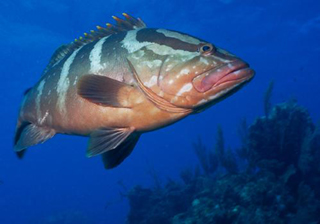 |
| photo courtesy of International Coral Reef Information Network |
The complicated physical framework that reef-building coral provide makes it an ideal habitat for thousands of fish species. Consequently, many different fish species have evolved with the reefs in order to take full advantage of all the biological productivity available.
The reef creates a diversity of habitats and food sources for many different species of fish. Different fishes may feed on algae, living coral tissue, plankton, other fishes, and some small "cleaner fishes" actually feed on the parasites of larger fishes. These feeding habits contribute to the balance of nature in a reef ecosystem.
Reef fish dynamics are also very complex. Some fish may only live on the reef as juveniles, while other species use nearby mangrove and seagrass habitats for refuge and then migrate to the reef later in life. Then there are some fish species that only visit the reef occassionally.
Reef fishes
contribute a large amount of biomass to reef ecosystems. They are vital
in that they transport large quantities of inorganic and organic nutrients
between different areas within a reef. Consequently, their presence, abundance,
and diversity is integral to the health and success of a reef ecosystem.
(www.coral.noaa.gov/faq2.shtml; Sorokin, 1995; Montogomery, 1990; www.coralreef.org/resources/photobank.html)
|
|
This web site was created by Lynn Tran at the North Carolina State University, Department of Mathematics, Science, and Technology Education on 7/12/03. Faculty advisor Dr. David Eggleston, NCSU, Department of Marine, Earth, & Atmospheric Sciences. Last updated December 29, 2003 .
